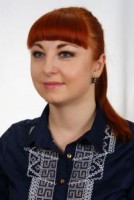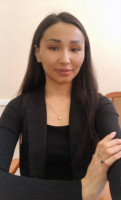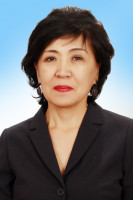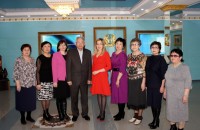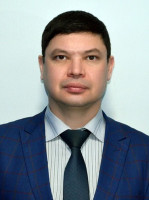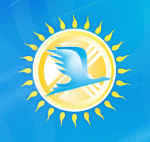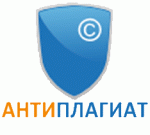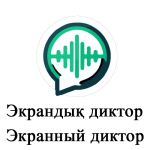Project: «Increasing the effectiveness of the state language teaching methods in kazakhstan's education system»
The aim and objectives of the project:
The aim of project is : to clarify the methods of management of effective teaching of the State language in modern innovative direction, the application of this methodology in practice, study paths: understanding the terms of economic and legal areas, identification of relevant issues. Concerning with this project has the following objectives:
- to review the latest innovations of technology education in the field of methodologies
- to offer the most effective methods of the various techniques of teaching state language;
- classification of ways to effectively study the terms of economic and legal spheres;
- to prepare a glossary of economic and legal spheres;
- An effective training study of vocational training methods in close relationship with specialty.
- classification of new technologies of teaching Kazakh language, improvement of advanced technologies;
- differentiating the methodical science of Turkic countries, countries of Europe, to introduce advanced technology into the domestic sphere of learning the State language;
- Accordingly, "State programme on languages development and undertake in 2010-2010 years" to improve methodology of teaching Kazakh language.
The list of executors:
a) Project leader:
1. Head of Kazakh Language and Culture of Kazakhstan Chair, Candidate of Philologcal sciences, Professor K.T. Kabatayeva.
b) Executors:
2. Leading scientific researcher, Candidate of Philologcal sciences, associate professor Zhukeyev T.B.
3. Leading scientific researcher, Doctor of Philologcal sciences,Professor Smagulov Zh.K.
4. Leading scientific researcher, Doctor PhD Zhalalova А.М.
5. scientific researcher, Master of Philology Bilyal B.K.
6. scientific researcher, Master of Pedagogical Sciences Baerbekova A.E.
7. scientific researcher, Master of Pedagogical Sciences Keldmagambetova Sh.S.
8. scientific researcher, Master of Philology Bazzhikeev K.K.
9. technical performer Nıgmetolla Zh.
Results:
Publications in foreign journals:
1. Z. Bazarbaeva, Y. Ormakhanova, N. Ospangaziyeva, B. Karbozova. Intonational Division of a Speech Flow in the Kazakh Language. //International Journal of Environmental and Science Education. Vol. 11, - NO. 10, 03 August, 2016. 3669 – 3678 pp. (Scopus)
2. Shara Mazhitayeva, Zhanbai Kadyrov, Zhandos Smagulov, Kamshat Toleubayeva, Sagila Rahimberlina. Do Function Words Belong to Part of Speech?
International Journal of Applied Linguistics & English Literature. ISSN 2200-3592 (Print), ISSN 2200-3452 (Online) Vol. 5 No. 7; December 2016 [Special Issue on Language and Literature] Australian International Academic Centre, Australia.
3. . Zh.B.Akhmetzhanova, K.T.Kabataeva, M.Sh.Toizhigitova. Comparative-typological Analysis of Kazakh Historical Songs. Mediterranean Journal of Social Sciences MCSER Publishing, Rome-Italy. ISSN 2039-2117 (online) ISSN 2039-9340 (print). Vol 6№552 September 2015.
Publication of books/chapters abroad:
Kabatayeva K.T., Ahmetova N.A., Shaban Aidoglu. Applied Kazakh-kyrgyz Language. Training manual. Karaganda, “Tengri”publishing house, 2017, 160p.
Monograph:
Kabatayeva K.T., Bylyal B.K., Baerbekova A.E. Increasing the effectiveness of state language teaching methods in Kazakhstan’s education system. Monography. Karaganda, “Tengri”, 2017, 203p.
Applicability of scientific results: the results of the study will be developed with a view to implementation in teaching practice of the State language. The results of the study will be designed in the form of methodological and practical recommendations. The effectiveness of the implementation of these recommendations will be conditioned by complex character study that would get maximize effect of using.
Target consumers of received results: Ministry of education and science; departments of education; educational institutions; the population. Civil society institutions, commercial organizations, the population. Dissemination of the results to potential users will be carried out through publications in journals, books, conferences, MEDIA, through participation in conferences, seminars, round tables, as well as on the website of the University and Department of Kazakh language and culture of Kazakhstan. The research project will be the production of monographs.
List of research papers published by the authors in 2015-2017 on the theme of research:
1. Z. Bazarbaeva, Y. Ormakhanova, N. Ospangaziyeva, B. Karbozova. Intonational Division of a Speech Flow in the Kazakh Language. //International Journal of Environmental and Science Education. Vol. 11, - NO. 10, 03 August, 2016. 3669 – 3678 pp. (Scopus)
2. Shara Mazhitayeva, Zhanbai Kadyrov, Zhandos Smagulov, Kamshat Toleubayeva, Sagila Rahimberlina. Do Function Words Belong to Part of Speech?
International Journal of Applied Linguistics & English Literature. ISSN 2200-3592 (Print), ISSN 2200-3452 (Online) Vol. 5 No. 7; December 2016 [Special Issue on Language and Literature] Australian International Academic Centre, Australia.
3. . Zh.B.Akhmetzhanova, K.T.Kabataeva, M.Sh.Toizhigitova. Comparative-typological Analysis of Kazakh Historical Songs. Mediterranean Journal of Social Sciences MCSER Publishing, Rome-Italy. ISSN 2039-2117 (online) ISSN 2039-9340 (print). Vol 6№552 September 2015.
4. Kabatayeva K.T., Bylyal B.K., Baerbekova A.E. Increasing the effectiveness of state language teaching methods in Kazakhstan’s education system. Monography. Karaganda, “Tengri”, 2017, 203p.
5. Kabatayeva K.T., Bylyal B.K., Baerbekova A.E. Economical Russian-Kazakh explanatory dictionary. Economical Russian-Kazakh explanatory dictionary. Training manual. Karaganda, “Tengri”, 2017, 170p.
6. Kabatayeva K.T., Bylyal B.K., Baerbekova A.E. Russian-Kazakh dictionary of legal terms. Karaganda, “Tengri”, 2017, 100p.
7. Kabatayeva K.T., Ahmetova N.A., Shaban Aidoglu. Applied Kazakh-kyrgyz Language. Training manual. Karaganda, “Tengri”publishing house, 2017, 160p.
8. Kabatayeva K.T., Bazhikeev K.K., Baerbekova A.E. Professional Kazakh language: A training manual for all economy specialties. Training manual. Karaganda, KEUK, 2017, 124p.
9. Kabatayeva K.T., Baerbekova A.E. Types of games used in the professional Kazakh language. Educational-methodical manual. Karaganda, KEUK, 71p.
10. Kabatayeva K.T., Kelmagambetova Sh.S. Professional Kazakh language: intended for specialty “Jurisprudence”. Training manual. Karaganda, KEUK, 2017, 129p.
11. Kabatayeva K.T., Kelmagambetova Sh.S. Baerbekova A.E. Professional Kazakh language: intended for specialty “International relations”. Training manual. Karaganda, KEUK, 2017, 128p.


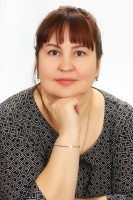

 Director of Resource Center for the projects COMPLETE and CACTLE
Director of Resource Center for the projects COMPLETE and CACTLE